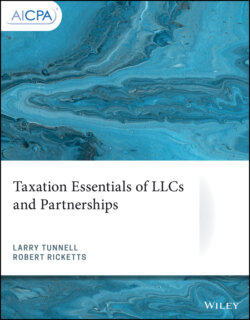Читать книгу Taxation Essentials of LLCs and Partnerships - Larry Tunnell - Страница 40
Self-employment tax issues
ОглавлениеGenerally speaking, a significant disadvantage of the partnership form relative to the S corporation form is the self-employment tax. A shareholder's share of pass-through income from an S corporation is generally not treated as earned income,13 and therefore does not trigger self-employment (SE) taxes; in contrast, a general partner's share of ordinary income (but not capital gains, interest income, and the like) from a partnership is subject to self-employment tax.
Different rules apply to limited partners. Because limited partners are not allowed to participate in management, their shares of partnership income are not classified as earned income and therefore do not trigger self-employment tax.14 This provision does not apply to guaranteed payments received in exchange for services rendered to or on behalf of the partnership.
For this reason, it is not uncommon for some general partners to structure a portion of their interest in a limited partnership as a limited partnership interest. For example, a partner may own a 1% general partnership interest and a 9% limited partnership interest. This structure does not protect the general partner from personal liability for partnership losses, but does result in the portion of partnership income attributable to the partner's limited partnership interest to be classified as unearned income, not subject to the self-employment tax. As long as the partner is fairly compensated for any services (for example, management services) provided in his or her capacity as a general partner, the IRS should not challenge this arrangement.
Although it is clear how these provisions apply to general and limited partnerships, it is much less clear how they should be applied to limited liability companies. The proposed regulations under Section 1402 attempt to provide some guidance on this question. As a general rule, the proposed regulations treat an investor in an LLC (or any other type of entity) as a limited partner unless such investor
has personal liability for the debts of or claims against the LLC by reason of being a partner or member;
has authority under state law to contract on behalf of the LLC;
or participates in the LLC's trade or business for more than 500 hours during the entity's taxable year.15
The proposed regulations establish two exceptions to these rules. First, no individual who is a service partner in a service partnership (including an LLC electing to be taxed as a partnership) can be classified as a limited partner. Therefore, members of LLCs engaged in the practice of health, law, engineering, architecture, accounting, actuarial science, or consulting will generally not be treated as limited partners (and therefore will be subject to SE taxes) unless they provide no services to or on behalf of the LLC.16
Second, the proposed regulations provide that a member of an LLC can be treated as a limited partner even if he or she participates in the LLC's trade or business for more than 500 hours if
the member would be treated as a limited partner if not for his or her participation in the LLC's trade or business for more than 500 hours;
other members who are treated as limited partners own a substantial continuing interest in the LLC; and
such other members have rights and obligations with respect to their membership interests in the LLC that are identical to those of the member participating in the LLC's activity for more than 500 hours during the taxable year.17
Note that Proposed Reg. Sec. 1.1402(a)-2(h) have expired and to date the IRS has not issued new regulations regarding the classification of investors in LLCs. However, the expired regulations do give us some guidance regarding the IRS opinion in these matters.
